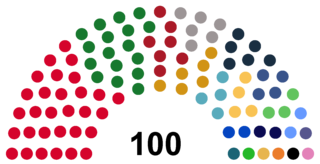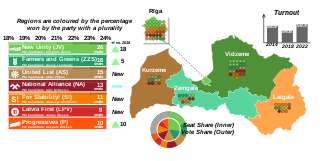
The Latvian Social Democratic Workers' Party is a social-democratic political party in Latvia and the second oldest existing Latvian political party after the Latvian Farmers' Union. It is currently represented with two seats in the parliament of Latvia as a part of the Union of Greens and Farmers alliance after an absence of 20 years. The party tends to hold a less Russophilic view than fellow social-democratic party "Harmony".

The Latvian Green Party is a green political party in Latvia.

The Latvian Russian Union (LKS) is a political party in Latvia supported mainly by ethnic Russians and other Russian-speaking minorities. The co-chairpersons of the Latvian Russian Union are Miroslavs Mitrofanovs and an alleged Russian agent Tatjana Ždanoka.

The Union of Greens and Farmers is an agrarian political alliance in Latvia. It is made up of the Latvian Farmers' Union, Latvian Social Democratic Workers' Party, and For Latvia and Ventspils.

The Christian Democratic Union is a minor Christian-democratic political party in Latvia. It is a member of the Awakening alliance and is currently led by Māra Viktorija Zilgalve and Secretary General Armands Agrums.

The Latgalian Farmers Party was a political party in Latvia representing the interests of Latgale farmers during the inter-war period.

The Latgalian Christian Peasant and Catholic Party was a Christian centrist political party in Latvia during the inter-war period. It was the largest party in the Latgale region, and was led by the bishop Jāzeps Rancāns.

The Christian National Union was a political party in Latvia in the inter-war period.

The Jewish National Bloc was a political alliance in Latvia in the 1920s. It consisted of Histadruth Hacionith, the Jewish National Democratic Party and Mizrachi.

The National Union was a far-right political party in Latvia during the inter-war period. It was led by Arveds Bergs.

The New Farmers' Union was a centrist political party in Latvia in the inter-war period.

The New Farmers-Small Landowners Party was a political party in Latvia during the inter-war period. It had two wings; the Farmers wing led by Markuss Gailītis and the Landowners wing led by Ādolfs Bļodnieks.

The Party for Peace and Order was a conservative political party in Latvia during the inter-war period.

The 1st Saeima was the parliament of Latvia from 7 November 1922 until 2 November 1925. It was the first Saeima to be elected after the Constitutional Assembly of Latvia had created the Constitution of Latvia and the Elections Law.

2nd Saeima was the parliament of Latvia from 3 November 1925, until 5 November 1928. The Social Democrat Pauls Kalniņš continued to hold the post of Speaker of the Saeima to which he was first elected during the 1st Saeima.

3rd Saeima was the parliament of Latvia from 6 November 1928 until 2 November 1931. Social Democrat Pauls Kalniņš continued to hold the post of Speaker of the Saeima to which he was first elected during the 1st Saeima.

4th Saeima was the parliament of Latvia from 3 November 1931 until the 15 May 1934 Latvian coup d'état. It was the last democratically elected Saeima until the restoration of Latvia’s independence in 1991 and the 5th Saeima elections in 1993.

The Progressives is a social-democratic and green political party in Latvia. The party was founded on 25 February 2017. Since 4 September 2021 its leaders have been Antoņina Ņenaševa and Atis Švinka. The Progressives have 11 seats on Riga City Council and 10 seats in the Saeima and one seat in the European Parliament.

Parliamentary elections were held in Latvia on 1 October 2022, following the end of the term of the 13th Saeima elected in 2018.










